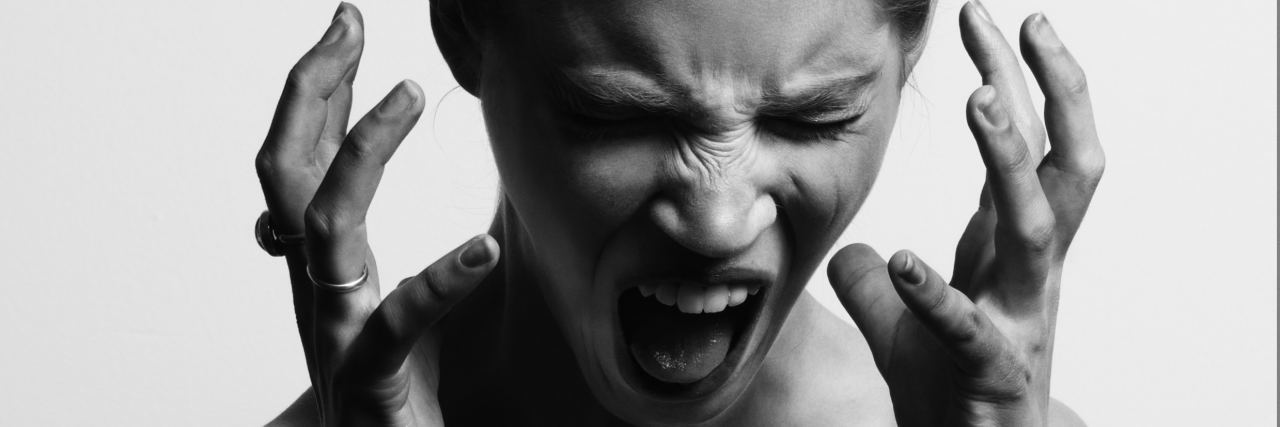What It's Like to Have Rage 'Blackouts' When You Live With Borderline Personality Disorder
Yes. I have aspects of borderline personality disorder (BPD). No. I am not afraid of me, and you shouldn’t be either.
I was afraid of myself before I could put a “label” on it. I hate saying label because it’s not really who I am. And it doesn’t excuse my behavior, but it does give me insight behind it. It took me 31 years to figure out that I exhibit many traits of BPD, and some of what I read scared me. My therapist reassured me that not all cases are as severe as the ones I had read about in books.
My therapist recognized the anger that I bottled up, my inability to let go of past hurts and resentment years before I saw a psychiatrist. My therapist even recommended mood stabilizers for me, but every doctor I saw just gave me something for depression and anxiety. Even my psychiatrist at first diagnosed me with major depressive disorder.
It wasn’t until an incident this past December that I really had a mirror held up to my face, and for the first time I was able to really see the monster I could become. Well, that is not entirely true. See — when I am faced with abandonment (by men in a relationship sense), it can be the smallest thing that triggers a past event, I become enraged. I start pushing this person away before they can fully push me away. I know that I am cruel, abrasive, hateful, manipulative, aggressive and then do a 180 and beg for another chance only to then turn back into the monster. Only, I often don’t remember what I have said or done. I remember bits and pieces, but not whole conversations.
After two dates, I overreacted with a guy for two days. I honestly cannot even begin to tell you everything I said because I didn’t know him well enough to blow up his phone with texts the way I did. I brought up the past a lot and connected it to him, blamed him for things, and he truly had done absolutely nothing wrong at all. I even showed up where he works. I didn’t make a huge confrontation, but I was snappy and vindictive in a place where he basically was cornered. At that point, pride meant nothing to me.
I call this my “blackout rage,” because my mind seems to want to protect me from every single thing I have said. I imagine if I knew everything, I would never be able to forgive myself. It’s hard enough as it is. When I snap back to reality, I hate myself. I go through extreme depressive episodes, try so hard to mend the bridge I just burned with the person, and most of all I feel absolutely worthless and unlovable.
I have always felt that because of my behavior, I was unlovable.
But with this particular guy, I couldn’t point any finger of blame at him like I could most of the guys in the past. He had done nothing wrong at all, but I became so paranoid that he would turn out like all of the rest that I reacted out of fear. And then I started to realize I didn’t even remember what I had said to him. So while I was lying in bed one night, agonizing over what I had done and letting the shame eat away at me from the inside, I simply did a Google search of something along the lines of not remembering what you’ve said in anger.
I didn’t even know BPD existed. I thought it was bipolar disorder. The more I read, the more I could relate. The next time I saw my psychiatrist, I simply replayed the situation that happened to him, and it’s what led him to diagnose me with BPD and put me on a mood stabilizer.
There are some days I still have setbacks and feel hopeless. I look back and think that if only I had known this a week before, then I could still have a chance with this guy. But it took that specific situation for me to really take a look at why I specifically lashed out so harshly and impulsively, but I couldn’t remember all of the details.
So now I am working on it. Not only in therapy, but with myself. I read books every day on the subject and order my own workbooks. I literally assign myself homework pretty much because I am determined now to be different since I know the cause. Since I am recognizing my causes, maybe I can deter the effects.
There is hope. I believe that and know that now. I am not unlovable. I am getting better at controlling my anger and emotions. I’m not perfect, but even in just a few short months, I am able to pause and process things before reacting more times than not. So no, I am not afraid of my diagnosis because it does not define who I am. It explains why I act, and that is something I can change.
Follow me on Instagram @liannahjameson for more.
Unsplash photo via Gabriel Matula

